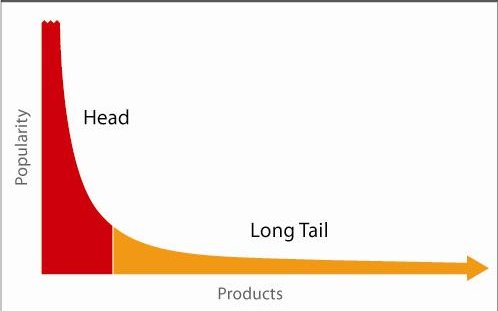A Note On Long Tail Keywords
Published on July 22, 2017
Published on Wealthy Affiliate — a platform for building real online businesses with modern training and AI.
I've been meaning to write this post for a while but kept forgetting. A couple of other posts recently reminded me to get it done, because there is a lot of misconception going around about what constitutes a long-tail keyword.
Let me just say right off the bat...
The length of the keyword, the number of words in it, has NOTHING to do with it being considered "long-tail" or not.
I have seen quite a few times people saying a long-tail keyword is a keyword with 4 or more words.
I've even seen them called "long-tailed" keywords, again because of the misconception that the keyword itself has a long tail.
Nope. That's not where it comes from.
Long-tail is actually referring to a group of keywords, and it refers to their popularity.
Look at the graph below:

In this graph, picture "Popularity" as search volume, and "products" as keywords.
The most popular keywords, the ones that get thousands of monthly searches, make up the head of the graph, and the less popular keywords make up the long tail.
Ready to put this into action?
Start your free journey today — no credit card required.
So a keyword can have 6 words in it, but if it brings in 10,000 searches per month, it's going to appear in the head of the graph.
Conversely, a keyword could have only 2 or 3 words in it, but if it only gets 10 searches, it's long tail.
What makes them "Long Tail" is that if plotted on this graph, they would appear in the lower end, simply because they have low popularity.
Another way to understand it is to think of other ways people use "Long Tail".
For Amazon, we are considered Long Tail affiliates, because there are lots of us, and each one might only bring in a few hundred dollars a month, or even a few thousand.
Meanwhile, there are the huge affiliates like Huffington Post which earn 6 figures per month from Amazon, but because there are only a few of those sites, they're classed in the head section, not long tail.
Hopefully that made sense and helps you understand that Long Tail keywords are just the ones that appear lower down the graph in terms of monthly searches, but make up a huge group en mass.
Why Does This Actually Matter?
It's true that the vast majority of long-tail keywords are going to have more words, and the vast majority of popular "head" keywords are going to be shorter. The longer a keyword gets, the fewer searches it's likely to have.
But it's important to understand the distinction, or you might target the wrong keywords.
I've seen people say they're targeting long-tail keywords and wonder why they're not getting traffic, when in fact they're targeting keywords that are super popular, and just happen to have 4 or 5 words in them. "How to make money online" is an example. It's not a long-tail keyword.
Also, the reason the tail is long, is because there are SO MANY of these keywords. They might only have 100 searches, or 50 searches, or even 10, but there are lots of them. That tail is actually never ending.
So the way long-tail keywords appeal to us as Internet Marketers is the sheer number of them we can target.
The basic strategy with using long-tail keywords is to use dozens of them, hundreds even. This way, you won't rank for all of them, but there are so many for you to collect, that traffic will just trickle in to your site for all of them, and that soon adds up.
Using Long Tail Keywords Means Focusing On A Large Number Of Keywords With Low Search Volume
Compare that to trying to target 4 or 5 super competitive "head" keywords, where you'll get nowhere.
If you want a rule, I would say anything with 250 searches or fewer could be considered long-tail (even if it only has 2 words).
So there you have it, my attempt at cutting through some of the myths about long-tail keywords. Use this information to make better choices about the keywords you target, and to understand the overall strategy better.
Share this insight
This conversation is happening inside the community.
Join free to continue it.The Internet Changed. Now It Is Time to Build Differently.
If this article resonated, the next step is learning how to apply it. Inside Wealthy Affiliate, we break this down into practical steps you can use to build a real online business.
No credit card. Instant access.